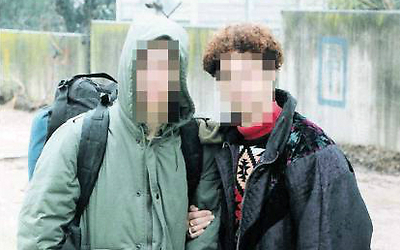Judge’s groundbreaking decision: In spite of widow’s strenuous objections, Israeli court finds parents of deceased combat soldier can use their son’s sperm to father a child.
By Yoram Yarkoni
This is a story involving some tough dilemmas: Who owns sperm left behind by a reserve soldier killed during an army training exercise – his widow or his parents? What was the will of the deceased, and does the state have the right to allow a child to be born already an orphan?

The bereaved mother with her son. ‘He definitely wanted children.’
In the end, the court handed down a precedential and groundbreaking ruling: The parents are entitled to a grandchild from their son’s sperm.
The affair began some 10 years ago when a combat reservist, in his late 20s, was killed during the course of an army training exercise, just four months after getting married. His widow consented to a suggestion by the army to freeze 19 vials of his sperm. At the same time, she maintained a warm relationship with his parents (in their 60s today), who after their son’s death adopted two orphans, in addition to their two other biological children.
Over time, the relationship between the parents and the widow soured: The parents wanted to use their son’s sperm to father a child; but the widow refused to bear the child herself, or to allow another woman to do so. Meanwhile, the widow married again and has two children. The dispute eventually ended up in Family Court.
During the deliberations, the widow claimed that the sperm could not be inherited and that she was the only one who had the legal right to decide what to do with it. The widow added that a decision in favor of the parents “could undermine social norms and the fabric of society,” and create a precedent that would allow any relative to make use of sperm left behind by a loved one after his death.
The parents of the deceased argued, however, that they knew for certain that their son would have wanted a descendant. The father stressed that even if the mother decided to live abroad with their grandchild, they would respect her wishes and visit him there.
“We knew for sure that our son loved children, and would certainly have wanted children after his death,” his bereaved mother said. “We would have liked the widow to give birth to a child from his sperm, but she chose otherwise.”
During the course of the court debates, the state opposed the request of the parents.
But in a groundbreaking decision a few days ago, Judge Miriam Kraus ruled that the parents are entitled to bring a grandchild into this world from their son’s sperm. The judge noted that while the sperm could not be inherited, it must be used in keeping with the wishes of the deceased before his death. The court, she added, believed that the deceased did indeed want children, and not necessarily from the widow, and that the parents were representing his wishes.
“The personal wishes of the deceased to leave behind a name and memorial cry out from the circumstances of the case… One cannot ignore the emotional need of the parents to make their child’s dream come true,” the judge wrote in her ruling.
“I didn’t shout for joy and we didn’t have a celebration because our son is dead and we had a court case against a widow,” the mother said on Tuesday. “However, it’s time we get the chance to achieve our son’s continuity.”
Meanwhile, the parents still have a way to go before realizing their dreams. The widow plans to appeal the decision. In addition, the sperm may be unusable as it was removed from the soldier’s body several hours after his death.
View original Ynet publication at: http://www.ynetnews.com/articles/0,7340,L-4640932,00.html







 Israeli New Shekel Exchange Rate
Israeli New Shekel Exchange Rate